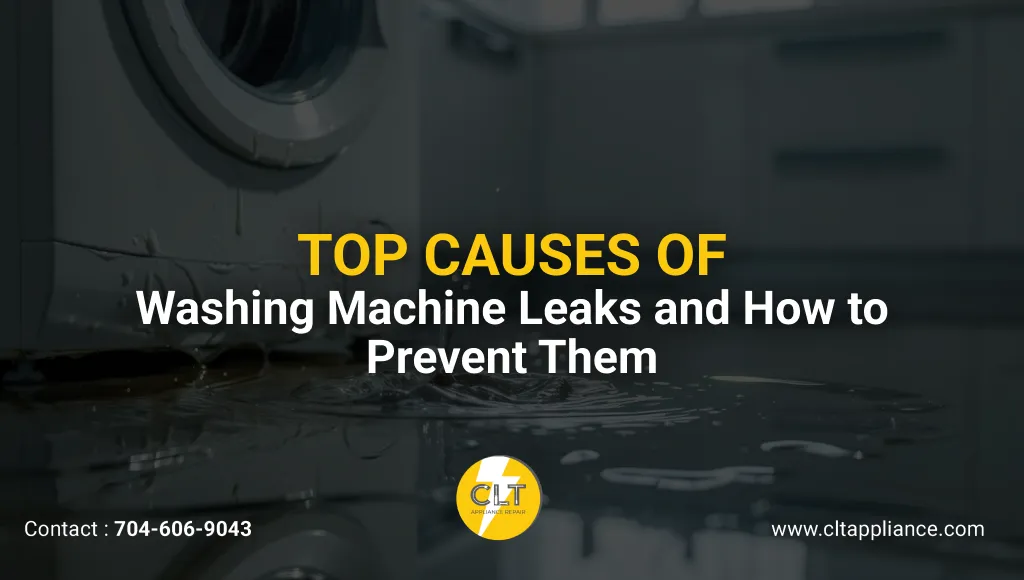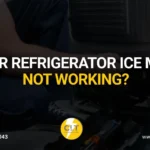Discovering water pooling around your washing machine can quickly escalate into a serious household issue. Water damage to flooring and walls leads to expensive repairs and potential mold growth.
Washing machines contain multiple components that can develop leaks. Regular usage strains various parts from seals to hoses to pumps, eventually compromising their watertight integrity.
Prevention through regular inspection saves money and hassle. Both top-loading and front-loading models share similar vulnerabilities, though older machines generally face higher risks of failure.
Most Common Causes That Lead to Washing Machine Leaks
Most common causes of washing machine leaks stem from aging components, improper use, and insufficient maintenance. When troubleshooting, first locate where water appears, front, back, or underneath your machine.
Faulty or Worn Gaskets Create Serious Leak Problems
Gaskets maintain watertight seals between washing machine components. These rubber parts eventually deteriorate or loosen, allowing water to escape. Top-loaders have main gaskets between the tub and agitator, while front-loaders use door gaskets as their primary water barrier.
Watch for:
- Cracks or tears in rubber
- Hardening or brittleness
- Visible gaps between components
Damaged Hoses Connect to Multiple Leak Issues
Your washing machine uses three main hose types:
- Fill hoses (water supply)
- Drain hoses (water removal)
- Internal hoses (component connections)
The causes of a washing machine leaking from the bottom often involve internal hose failures. Rubber hoses typically last 3-5 years before deteriorating, while metal-braided options offer better durability.
Water Pump Problems Frequently Cause Significant Leaks
The water pump circulates and drains water during cycles. When investigating the causes of water leaking from the washing machine, pump failures typically result in water underneath the appliance. Pumps can develop seal deterioration, housing cracks, or connection issues.
Front-Loading Washers Face Unique Door Seal Challenges
Front-loader door seals prevent water from escaping during operation. What causes water to leak from the bottom of the washing machine in front-loaders often relates to compromised door seals. Regular cleaning helps prevent mold growth and deterioration that can impact seal performance.
Internal System Problems That Cause Serious Leaks
Several internal components can develop hidden leak-causing problems inside your machine’s housing.
Tub Defects Contribute to Unexpected Water Problems
Washing machines have inner perforated baskets and outer water-containing tubs. What is the cause of a washing machine leaking sometimes relates to outer tub issues like hairline cracks, seal failures, or bearing wear. These typically cause water beneath the machine and require professional repair.
Water Level Switch Malfunctions Create Overflow Issues
The water level switch controls water input. When it fails, your washer may overfill or continue adding water beyond appropriate levels, causing overflow from the top or front rather than underneath.
Usage and Installation Issues That Allow Water Escape
Some causes of washing machine leaks relate to usage rather than part failures.
Overloading Creates Pressure on Seals and Components
Exceeding capacity strains internal components. When researching what causes water to leak from the bottom of a washing machine, consider whether overloading occurs regularly, forcing water past seals and creating excessive vibration that loosens connections.
Unlevel Washers Develop Vibration-Related Failures
Improperly leveled machines vibrate excessively during spin cycles, loosening connections and creating leak points. Check your machine’s level with a bubble level and adjust the feet until flat.
Effective Strategies for Washing Machine Leak Prevention
Preventing leaks costs less than repairing water damage. Regular inspection and maintenance help avoid the most common causes of washing machine leaks.
Regular Maintenance Practices Stop Many Common Leaks
Monthly checks should include examining hoses for wear, checking connection points for moisture, cleaning door seals, and verifying proper drain hose positioning.
Set calendar reminders to maintain consistent inspection schedules. These simple checks often catch minor issues before they become major leaks.
Hose Replacement Schedule Prevents Catastrophic Failures
Replace standard rubber hoses every 3-5 years, regardless of visible condition. Consider upgrading to stainless steel braided hoses, auto-shutoff hoses, or flood-safe hoses with mechanical shutoffs for better protection against causes of washing machine leaking from the bottom.
Proper Detergent Usage Prevents Internal Buildup
Using incorrect detergent types or excessive amounts creates residue buildup, overflow issues, and clogged components. Always follow manufacturer guidelines for detergent type and quantity to prevent potential leak-causing problems.
When Professional Help Becomes Your Best Option
While many washing machine issues can be addressed through DIY methods, certain leak scenarios require professional expertise. Recognizing these situations saves time and prevents further damage.
Complex Internal Component Failures Need Expertise
When dealing with causes of washing machine leaks, or any other appliance like heaters, dryers etc., involving internal components like pumps, motors, or control systems, professional diagnosis provides the most efficient solution. These components typically require specialized tools and knowledge for proper repair.
Signs that indicate you need professional help include:
- Persistent leaks despite addressing the obvious external issues
- Unusual sounds accompanying the leak (grinding, buzzing)
- Multiple leak points occurring simultaneously
- Water leaking directly from sealed assemblies
Most repair professionals can quickly diagnose these issues through targeted testing and component evaluation.
Cost-Benefit Analysis Supports Professional Repair
While calling a technician involves upfront costs, it often proves more economical than DIY attempts that might cause additional damage. Professional repairs also typically include warranties that protect against recurring issues.
When evaluating whether to call a professional, consider:
- Age of your washing machine
- Availability of replacement parts
- Your technical comfort level
- Potential for water damage to your home
Many washing machine repairs fall in the $100-300 range, significantly less than replacing the entire appliance or repairing water damage to flooring and walls.
Final Thoughts
Understanding these problems helps homeowners take proactive measures before water damage occurs. While washing machines contain many potential leak points, a systematic approach to maintenance significantly reduces risks.
CLT Appliance Repair provides experienced technicians who diagnose and fix washing machine leaks efficiently throughout the Charlotte NC area. Our skilled professionals handle all major washing machine brands and models with guaranteed repairs. Contact us for fast, reliable service that keeps your appliances running smoothly.
Frequently Asked Questions
How long should washing machine hoses last before replacement?
Standard rubber washing machine hoses should be replaced every 3-5 years, even if they appear in good condition. Stainless steel braided hoses typically last longer but should still be inspected regularly for signs of wear or mineral buildup at connection points.
Can hard water contribute to washing machine leaks?
Yes, hard water causes mineral deposits to build up on valves, hoses, and seals, potentially creating leak points. Installing a water softener can help extend the life of internal components, especially in regions with very hard water.
Can a washing machine leak damage my home’s foundation?
Persistent washing machine leaks can potentially damage foundations, especially if the appliance is located on an upper floor or against foundation walls. Water that seeps under flooring may reach foundation concrete, causing deterioration over time.
Author

- John Bennett
- John Bennett is a seasoned appliance repair specialist at CLT Appliance Repair, where he brings over a decade of technical expertise and a strong commitment to customer satisfaction. With a background in electrical and mechanical systems, John has built a reputation for reliable, efficient, and honest repair services across a wide range of household appliances-including refrigerators, washing machines, ovens, and more.







